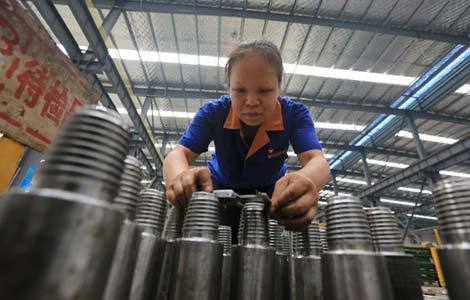The jarring sounds of heavy metals
Updated: 2013-07-16 10:08
By Dong Fangyu (China Daily)
|
||||||||
The Ministry of Environmental Protection and Ministry of Land and Resources started a nationwide study on soil pollution in 2006 and have compiled a huge database of soil samples. However, the five-year national survey, which cost 1 billion yuan, has not been made public despite a Beijing lawyer's plea to disclose it in the interest of the people.
Given the severity and "secrecy" of heavy metal pollution, people are getting increasingly cautious about what they eat and drink. They fear that toxic effluents from industries are seeping into the soil and underground water table in many places in China.
Unlike smog and particulate matter that can be seen and readily felt, soil and water contamination has escaped public attention. Nevertheless, it has been threatening the safety of crops, drinking water, animals and plants for years, and thus putting humans, who are at the top of the food chain, at risk. Yet the public remains unaware of the real situation.
The good news is that the severity of the problem and repeated public enquiries prompted the Ministry of Land and Resources to announce in June that a detailed "nationwide pollution map" is being drawn up to gauge to what extent has soil been contaminated by heavy metals.
The detailed pollution map, however, should be accompanied by a thorough investigation to identify the sources of heavy metal pollution and determine whether local authorities are colluding with the industrial and mining sectors to conceal the real impact of soil and water contamination on the environment in their pursuit of economic gains.
For example, even after shoals of dead fish were found floating in the Hejiang River from July 1 to 5, the local environmental authorities did not detect the problem because they had "limited detection means". That dangerous chemicals had caused the death of the fish was known only after a higher environmental protection bureau launched a probe. Such delay and negligence could prove very costly.
Since the process of decontaminating soil is very expensive and could take years to execute, it is all the more important to prevent heavy metal-laced industrial wastes from flowing into rivers and lakes or being dumped on land without being properly treated.
Authorities at all levels have to work together to set up a comprehensive supervision and detection mechanism for heavy metal pollution, instead of waiting for a major environmental disaster before swinging into temporary action. Besides, it is the social responsibility of the authorities to inform the public of the level of soil and water pollution in time.
The author is a reporter with China Daily.
E-mail: dongfangyu@chinadaily.com.cn.

 Putin wants Snowden to go, but asylum not ruled out
Putin wants Snowden to go, but asylum not ruled out
 Apple to probe death of Chinese using charging iPhone
Apple to probe death of Chinese using charging iPhone
 Investment falters as industrial activity flags
Investment falters as industrial activity flags
 Rape victim's mother wins appeal
Rape victim's mother wins appeal
 Reproduction of 'Sunflowers' displayed in HK
Reproduction of 'Sunflowers' displayed in HK
 Land Rover enthusiasts tour the world
Land Rover enthusiasts tour the world
 US star sprinter fails drug test
US star sprinter fails drug test
 Protests erupt after verdict
Protests erupt after verdict
Most Viewed
Editor's Picks

|

|

|

|

|

|
Today's Top News
China calls for new talks on Iran nuclear issue
Global warming may largely raises sea level
Putin wants Snowden to go, asylum not ruled out
Trailblazer reaches out to inmates on death row
Air crash payouts could differ
Cabinet promises more funds for smaller firms
Capital prison tests therapy on inmates
Regulation to improve public organ donations
US Weekly

|

|






